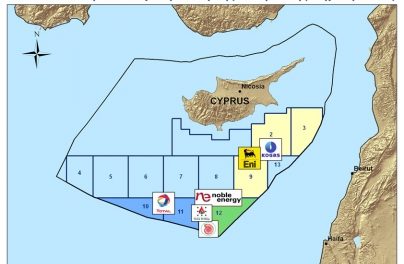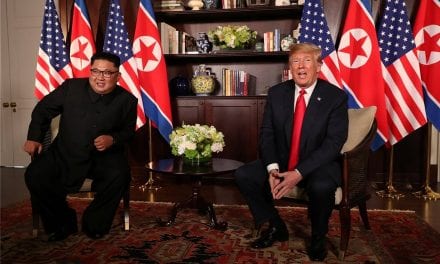Βy RFE/RL
The U.S. Senate has passed a major defense bill that would block the sale of U.S. F-35 fighter jets to Turkey unless it abandons a deal to buy S-400 missile-defense systems from Russia, drawing criticism from Ankara.
The legislation, passed 85-to-10 late on June 18, also contains a provision to block President Donald Trump’s deal with China to allow the telecommunications giant ZTE to stay in business despite violations of U.S. sanctions against Iran and North Korea.
The two provisions targeting Turkey and ZTE are part of the massive National Defense Authorization Act, which authorizes over $700 billion in defense spending on military programs and weapons.
The House of Representatives has passed its own version of the bill, and the two measures must now be reconciled before a compromise measure can be passed and sent to Trump for his signature or veto.
There have been bipartisan efforts in both the Senate and House to stop the sale of the most advanced U.S. fighter jet to Turkey, a NATO ally that has an increasingly strained relationship with Washington.
Turkey is currently one of the partner countries in the F-35 program and had plans to buy about 100 of the stealth jets, which are manufactured by Lockheed Martin Corp.
The Senate bill would prevent delivery of the jets unless Trump certifies that Turkey is not threatening NATO, purchasing defense equipment from Russia, or detaining U.S. citizens.
Turkish Prime Minister Binali Yildirim said on June 19 that the Senate’s passage of the bill was unfortunate and went against the spirit of strategic partnership. He said that Turkey has alternatives and that the bill would not make the country vulnerable.
NATO officials have repeatedly warned Turkey that the Russian S-400 systems it agreed to buy in 2016 are not compatible with NATO defenses, but Turkey has largely dismissed those concerns and proceeded with the Russian deal.
U.S. legislators in approving the provision also have cited concerns about Ankara’s warming ties with Moscow under President Recep Tayyip Erdogan and his arrest of U.S. citizens and consulate staff as part of a purge of his opponents since an aborted coup against him in July 2016.
The Senate defense bill’s provision to kill Trump’s agreement to allow ZTE to resume purchases from U.S. technology companies so that it can stay in business is not included in the House version of the bill, which has a narrower ban on the Defense Department using equipment or services from ZTE or fellow Chinese telecommunications giant Huawei.
Republicans and Democrats expressed national security concerns about ZTE after it broke an agreement to discipline executives who had admitted to a conspiracy to evade U.S. sanctions by selling sensitive equipment to Iran and North Korea.
Under the Trump deal, ZTE would have to pay another $1 billion in fines for its sanctions violations in exchange for the United States dropping an earlier ban on its purchases of equipment from U.S. suppliers, which the company contended would put it out of business.
The move to block Trump’s deal caused a plunge of almost 17 percent in ZTE’s stock value in the first few minutes of trading on the Hong Kong stock exchange on June 19. The company’s stock has fallen by about 60 percent as a result of the U.S. debate over its future.
Ankara slams US Senate decision
Turkish Prime Minister Binali Yıldırım on June 19 harshly criticized a U.S. Senate decision to block F-35 sales to Turkey.
“The decision is an unfortunate development,” Yıldırım told reporters.
“Turkey is not without alternatives. Such attempts are regrettable and goes against the soul of strategic partnership,” the prime minister said.
Yıldırım’s comments came after the U.S. Senate on June 18 passed a $716 billion defense policy bill including an amendment prohibiting sales to Turkey of F-35 Joint Strike Fighter jets made by Lockheed Martin Corp.
The Republican-controlled Senate voted 85-10 for the annual National Defense Authorization Act, or NDAA, which authorizes U.S. military spending but is generally used as a vehicle for a broad range of policy matters.
According to the NDAA, U.S. President Donald Trump should certify that Turkey does not threaten NATO, purchase defense equipment from Russia or detain U.S. citizens.
Senators included the legislation because of the imprisonment of U.S. pastor Andrew Brunson in Turkey’s Aegean province of İzmir on terror charges and Turkish government’s decision to purchase S-400 air defense system from Russia.
The amendment claimed that purchasing the S-400 system from Russia increases tensions and risks to the NATO alliance.
The U.S. Defense Ministry is supposed to prepare a report on relations with Turkey in 60 days. Any sales of F-35 and F-16 fighters, Patriot air defense systems, and military helicopters by Pentagon to Turkey will be blocked until the report is submitted to the Congress committees.
Criticizing the U.S. for trying to force Turkey not to purchase the S-400 air defense system from Russia, Turkish Foreign Minister Mevlüt Çavuşoğlu on June 4 recalled that Turkey had been trying to purchase the Patriot air defense system from the U.S., but the missiles have never been sold to Turkey when they were needed the most.
“This is the reason why Turkey, which is in urgent need of these weapons, has chosen to purchase them from Russia,” he added during his visit to Washington.
Touching upon the F-35 fighter jets, Çavuşoğlu also emphasized that if Washington, as the worst-case scenario, decides not to sell F-35s to Turkey, then no one can tell Turkey not to buy aircraft from a second country or not to produce its own.
According to the F-35 project agreement, the first two F-35s must be handed over to Turkey in the U.S. by June 21 for training and testing purposes.
$639 billion in base defense spending
Before the Senate bill can become law, it must be reconciled with one already passed by the House of Representatives. That compromise measure must then be passed by both chambers and signed into law by Trump.
Considered must-pass legislation, the fiscal 2019 Senate version of the NDAA authorizes $639 billion in base defense spending, for such things as buying weapons, ships and aircraft and paying the troops, with an additional $69 billion to fund ongoing conflicts.
The measure also includes an amendment to bar the U.S. military from providing aerial refueling support for the Saudi-led coalition in Yemen unless U.S. Secretary of State Mike Pompeo certifies that Saudi Arabia is taking urgent steps to end the civil war in Yemen, ease the humanitarian crisis there and reduce the risk to civilians.
It also overrules the White House deal with Chinese telecom firm ZTE and re-imposes a ban on hi-tech chip sales to the company.


















